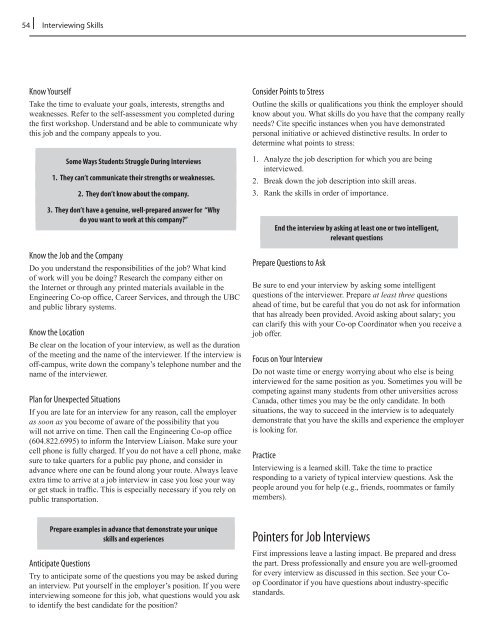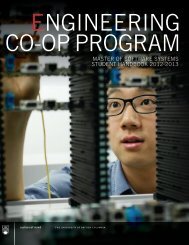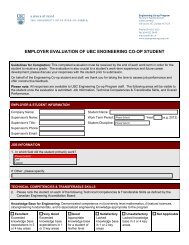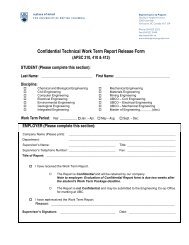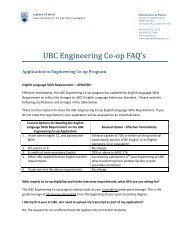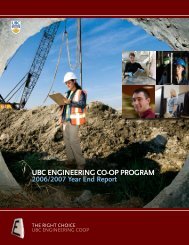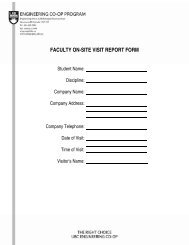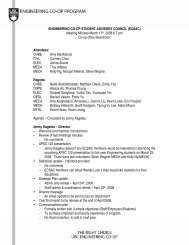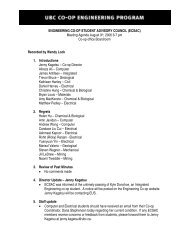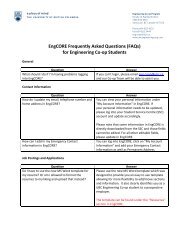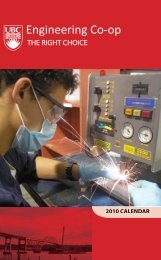ENGINEERING CO-OP PROGRAM
Download - Engineering Co-op Office - University of British Columbia
Download - Engineering Co-op Office - University of British Columbia
- No tags were found...
You also want an ePaper? Increase the reach of your titles
YUMPU automatically turns print PDFs into web optimized ePapers that Google loves.
54 Interviewing Skills<br />
Know Yourself<br />
Take the time to evaluate your goals, interests, strengths and<br />
weaknesses. Refer to the self-assessment you completed during<br />
the first workshop. Understand and be able to communicate why<br />
this job and the company appeals to you.<br />
Know the Job and the Company<br />
Do you understand the responsibilities of the job? What kind<br />
of work will you be doing? Research the company either on<br />
the Internet or through any printed materials available in the<br />
Engineering Co-op office, Career Services, and through the UBC<br />
and public library systems.<br />
Know the Location<br />
Some Ways Students Struggle During Interviews<br />
1. They can’t communicate their strengths or weaknesses.<br />
Be clear on the location of your interview, as well as the duration<br />
of the meeting and the name of the interviewer. If the interview is<br />
off-campus, write down the company’s telephone number and the<br />
name of the interviewer.<br />
Plan for Unexpected Situations<br />
2. They don’t know about the company.<br />
3. They don’t have a genuine, well-prepared answer for “Why<br />
do you want to work at this company?”<br />
If you are late for an interview for any reason, call the employer<br />
as soon as you become of aware of the possibility that you<br />
will not arrive on time. Then call the Engineering Co-op office<br />
(604.822.6995) to inform the Interview Liaison. Make sure your<br />
cell phone is fully charged. If you do not have a cell phone, make<br />
sure to take quarters for a public pay phone, and consider in<br />
advance where one can be found along your route. Always leave<br />
extra time to arrive at a job interview in case you lose your way<br />
or get stuck in traffic. This is especially necessary if you rely on<br />
public transportation.<br />
Consider Points to Stress<br />
Outline the skills or qualifications you think the employer should<br />
know about you. What skills do you have that the company really<br />
needs? Cite specific instances when you have demonstrated<br />
personal initiative or achieved distinctive results. In order to<br />
determine what points to stress:<br />
1. Analyze the job description for which you are being<br />
interviewed.<br />
2. Break down the job description into skill areas.<br />
3. Rank the skills in order of importance.<br />
Prepare Questions to Ask<br />
Be sure to end your interview by asking some intelligent<br />
questions of the interviewer. Prepare at least three questions<br />
ahead of time, but be careful that you do not ask for information<br />
that has already been provided. Avoid asking about salary; you<br />
can clarify this with your Co-op Coordinator when you receive a<br />
job offer.<br />
Focus on Your Interview<br />
Do not waste time or energy worrying about who else is being<br />
interviewed for the same position as you. Sometimes you will be<br />
competing against many students from other universities across<br />
Canada, other times you may be the only candidate. In both<br />
situations, the way to succeed in the interview is to adequately<br />
demonstrate that you have the skills and experience the employer<br />
is looking for.<br />
Practice<br />
End the interview by asking at least one or two intelligent,<br />
relevant questions<br />
Interviewing is a learned skill. Take the time to practice<br />
responding to a variety of typical interview questions. Ask the<br />
people around you for help (e.g., friends, roommates or family<br />
members).<br />
Prepare examples in advance that demonstrate your unique<br />
skills and experiences<br />
Anticipate Questions<br />
Try to anticipate some of the questions you may be asked during<br />
an interview. Put yourself in the employer’s position. If you were<br />
interviewing someone for this job, what questions would you ask<br />
to identify the best candidate for the position?<br />
Pointers for Job Interviews<br />
First impressions leave a lasting impact. Be prepared and dress<br />
the part. Dress professionally and ensure you are well-groomed<br />
for every interview as discussed in this section. See your Coop<br />
Coordinator if you have questions about industry-specific<br />
standards.


